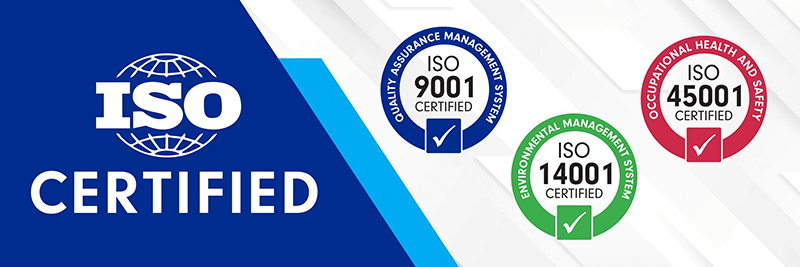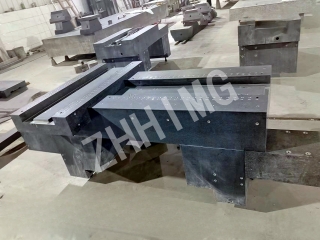In the field of industrial production, the stable operation of equipment is the core to ensuring production capacity and efficiency. However, the problem of equipment downtime caused by rusting of traditional cast iron bases has long plagued the manufacturing industry. From precision measuring instruments to heavy mechanical equipment, once cast iron bases rust, it will not only lead to inaccurate measurement and wear of mechanical parts, but also may cause equipment failure and production interruption. The granite base, with its natural anti-corrosion properties, offers enterprises a once-and-for-all solution.
Rusting of cast iron bases: An "invisible killer" in industrial production
Cast iron bases were once widely used in various industrial equipment due to their low cost and easy processing. However, cast iron is essentially an iron-carbon alloy. Its internal structure contains a large number of microscopic pores and impurities, which are highly prone to oxidation reactions with moisture and oxygen in the air, forming rust. In damp workshop environments, coastal areas with high salt spray, or when exposed to chemical substances such as coolant and acid or alkali cleaners, the rusting rate of cast iron bases will increase exponentially. According to statistics, in a common industrial environment, cast iron bases will show obvious rust on average every 2 to 3 years. However, in high-humidity or corrosive environments, its service life can even be shortened to less than one year.
After rusting, the surface of the cast iron base will gradually peel off and become uneven, resulting in a decrease in the installation accuracy of the equipment and causing problems such as intensified vibration and loose components. For precision measuring equipment, minor deformations caused by rust on the base may lead to measurement errors expanding to more than ±5μm, making product inspection meaningless. For heavy-duty machine tools, structural damage caused by rust may even lead to sudden equipment shutdowns, resulting in the paralysis of the production line. A certain auto parts manufacturing factory once suffered from frequent malfunctions of its precision coordinate measuring instrument due to rusting of the cast iron base. The direct economic loss caused by equipment downtime within a year exceeded one million yuan.
Granite base: A Natural anti-corrosion "Protective shield"
Granite is a natural stone formed through geological processes over hundreds of millions of years. Its internal mineral crystals are closely crystallized, and its structure is dense and uniform, endowing it with an inherent advantage in corrosion resistance. The main components of granite (quartz, feldspar, mica, etc.) have extremely stable chemical properties and do not react with common acidic or alkaline substances. Even if they are in long-term contact with corrosive liquids such as coolant and cleaning agents, no corrosion will occur. In addition, the surface of granite has almost no pores, and water cannot penetrate into the interior, eliminating the possibility of oxidation and rusting from the root.
Experimental data show that when granite and cast iron are simultaneously placed in a highly corrosive environment containing a 10% sodium chloride solution, the cast iron shows obvious rust spots within 48 hours, while after 1000 hours of testing, the surface of the granite remains as smooth as new without any corrosion marks. This outstanding anti-corrosion performance enables granite bases to demonstrate irreplaceable advantages in industries with strong corrosiveness such as chemical engineering, food processing, and Marine engineering.
Full Life cycle cost Optimization: From "short-term Investment" to "Long-term Returns"
Although the initial procurement cost of granite bases is higher than that of cast iron, from the perspective of the entire life cycle of the equipment, the comprehensive benefits it brings far exceed the cost difference. The cast iron base requires frequent maintenance due to rust (such as rust removal and repainting), and the annual maintenance cost accounts for approximately 10% to 15% of the purchase price. When the rust is severe, the entire base needs to be replaced, which directly increases the equipment downtime and replacement costs. The granite base requires almost no maintenance, has a service life of over 20 years, and maintains stable accuracy and performance throughout use, effectively reducing equipment failures and downtime.
After a certain electronic manufacturing enterprise replaced the cast iron base of the production line with a granite base, the equipment downtime rate decreased by 85%, the calibration cycle of the measuring equipment was extended from once a month to once a year, and the annual comprehensive cost was reduced by 40%. In addition, the high stability of the granite base has also increased the product qualification rate, indirectly creating higher economic benefits.
In the wave of industrial equipment upgrading, the shift from cast iron bases to granite bases is not only an iteration of materials but also a leap in production concepts from "making do" to "excellence". By choosing a granite base, enterprises can not only completely solve the problem of rust and corrosion, but also achieve a dual improvement in production efficiency and economic benefits through the long-term stable operation of equipment, laying a solid foundation for high-quality development in the era of intelligent manufacturing.
Post time: May-13-2025


